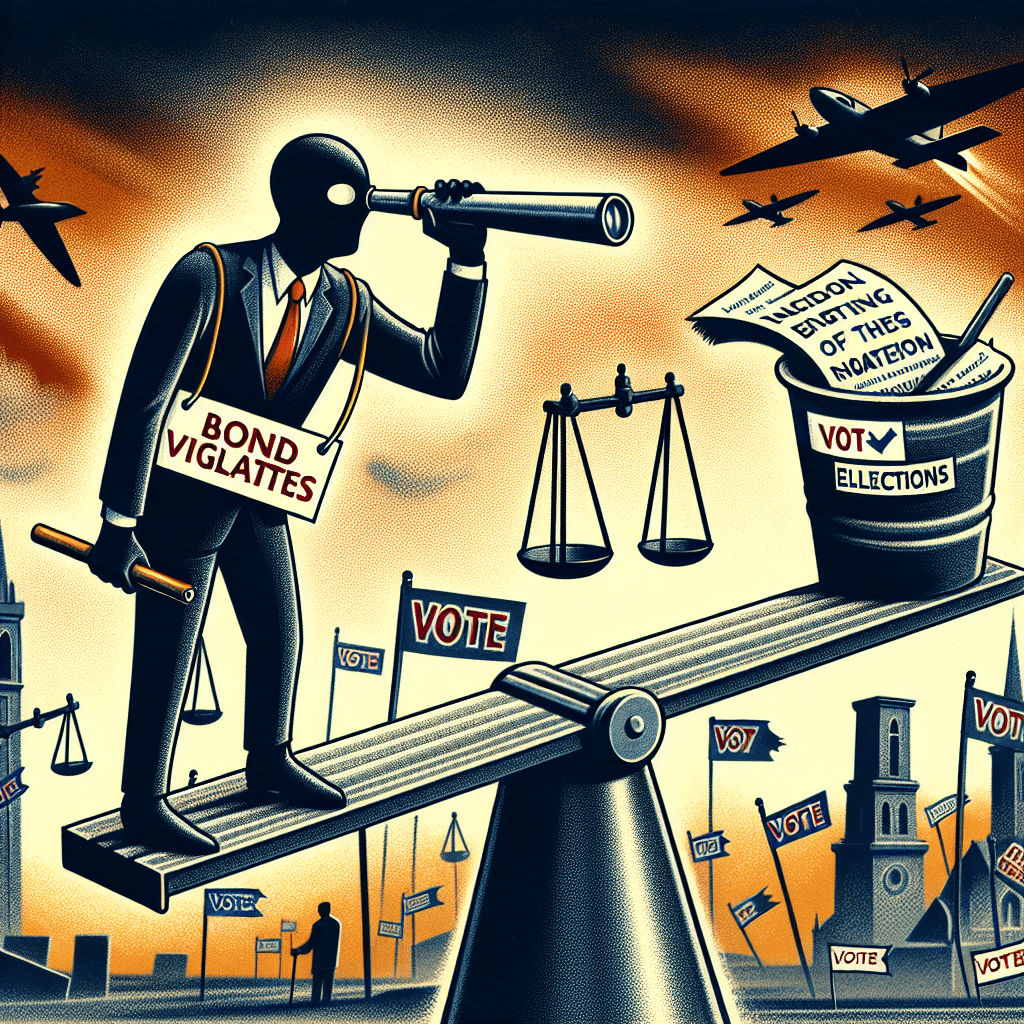“Bond Vigilantes: Shaping Elections with Financial Fury”
Introduction
“Bond Vigilantes Cast Their Vote: Discontent in the Election Cycle” explores the intricate relationship between financial markets and political landscapes, focusing on how bond investors, often referred to as “bond vigilantes,” influence and react to electoral processes. As guardians of fiscal discipline, these investors wield significant power, using their investment choices to express approval or disapproval of government policies. This dynamic becomes particularly pronounced during election cycles, when political promises and economic realities collide. The piece delves into the historical context of bond vigilantes, their impact on government borrowing costs, and the broader implications for economic stability and policy-making. Through this lens, the article examines the current political climate, highlighting the tensions and uncertainties that arise when financial markets and democratic processes intersect.
Understanding Bond Vigilantes: Their Role in the Election Cycle
In the intricate world of finance, bond vigilantes have long been a formidable force, wielding significant influence over government fiscal policies. These investors, who actively sell bonds in response to fiscal policies they perceive as unsustainable, can drive up interest rates, thereby increasing the cost of borrowing for governments. As the election cycle unfolds, the actions of bond vigilantes become particularly noteworthy, as they often reflect broader economic sentiments and can signal discontent with the fiscal direction proposed by political candidates.
To understand the role of bond vigilantes in the election cycle, it is essential to first grasp their motivations. Bond vigilantes are typically concerned with inflation and fiscal irresponsibility. When governments engage in excessive borrowing or implement policies that could lead to inflationary pressures, these investors may react by selling off bonds. This sell-off results in higher yields, which in turn raises borrowing costs for the government. Consequently, bond vigilantes serve as a check on fiscal policy, ensuring that governments remain accountable and prudent in their financial management.
During an election cycle, the scrutiny of bond vigilantes intensifies. Political candidates often propose ambitious spending plans to garner voter support, which can lead to concerns about fiscal sustainability. If bond vigilantes perceive these proposals as potentially inflationary or fiscally irresponsible, they may react by selling bonds, thereby expressing their discontent. This reaction can serve as a barometer for the financial community’s confidence in a candidate’s economic policies. Moreover, the actions of bond vigilantes can influence public perception, as rising interest rates and increased borrowing costs become tangible indicators of market skepticism.
Transitioning to the broader implications, the influence of bond vigilantes extends beyond mere market reactions. Their actions can have a profound impact on the political landscape, as candidates may be forced to adjust their fiscal policies to appease these powerful market players. In some cases, the pressure exerted by bond vigilantes can lead to a reevaluation of proposed spending plans, prompting candidates to adopt more fiscally conservative approaches. This dynamic underscores the delicate balance between political aspirations and economic realities, highlighting the pivotal role that bond vigilantes play in shaping policy discourse.
Furthermore, the presence of bond vigilantes in the election cycle underscores the interconnectedness of global financial markets. In an era of unprecedented economic interdependence, the actions of bond vigilantes in one country can have ripple effects across the globe. As investors react to fiscal policies in major economies, their decisions can influence interest rates and borrowing costs in other nations, thereby affecting global economic stability. This interconnectedness amplifies the significance of bond vigilantes, as their actions can serve as a catalyst for broader economic shifts.
In conclusion, bond vigilantes are a critical component of the financial ecosystem, particularly during election cycles. Their actions reflect broader economic sentiments and serve as a check on fiscal policy, ensuring that governments remain accountable to market forces. As political candidates navigate the complexities of fiscal policy, the influence of bond vigilantes cannot be underestimated. Their ability to sway interest rates and borrowing costs underscores their power in shaping economic discourse, highlighting the intricate interplay between politics and finance. As such, understanding the role of bond vigilantes is essential for comprehending the broader dynamics at play during election cycles, offering valuable insights into the intersection of fiscal policy and market forces.
The Impact of Bond Vigilantes on Political Campaigns
In the intricate world of finance, bond vigilantes have long been recognized as influential players, wielding their power to sway economic policies and, by extension, political campaigns. As the election cycle unfolds, their presence becomes increasingly significant, casting a shadow over political strategies and decisions. Bond vigilantes, a term coined to describe investors who sell off bonds in response to fiscal policies they perceive as irresponsible, can dramatically impact interest rates and government borrowing costs. This, in turn, places pressure on political candidates to adopt more fiscally prudent platforms, lest they incur the wrath of these market forces.
The influence of bond vigilantes is particularly pronounced during election cycles, when political promises are scrutinized not only by the electorate but also by financial markets. Candidates proposing expansive fiscal policies, such as increased public spending or tax cuts without clear funding mechanisms, may find themselves at odds with these market participants. The resulting sell-off in government bonds can lead to higher interest rates, complicating the economic landscape and potentially undermining the credibility of such political platforms. Consequently, candidates are often compelled to temper their proposals, aligning them more closely with market expectations to maintain economic stability.
Moreover, the actions of bond vigilantes can serve as a barometer for the financial community’s confidence in a government’s fiscal discipline. When bond yields rise sharply, it signals a lack of confidence in the government’s ability to manage its finances, which can have a ripple effect on the broader economy. This scenario can be particularly damaging during an election cycle, as it may erode public confidence in the incumbent administration’s economic stewardship. In response, political candidates may be forced to pivot their messaging, emphasizing fiscal responsibility and economic prudence to reassure both voters and financial markets.
In addition to influencing political platforms, bond vigilantes can also affect the timing and focus of political campaigns. As interest rates fluctuate in response to bond market dynamics, candidates may need to adjust their campaign strategies to address emerging economic concerns. For instance, a sudden spike in interest rates could shift the focus of a campaign towards issues of economic stability and fiscal responsibility, overshadowing other policy areas. This dynamic interplay between bond markets and political campaigns underscores the importance of economic literacy among political candidates, as they navigate the complexities of fiscal policy and market expectations.
Furthermore, the impact of bond vigilantes extends beyond national borders, influencing international perceptions of a country’s economic health. In an increasingly interconnected global economy, the actions of bond vigilantes in one country can have far-reaching implications, affecting foreign investment and international relations. Political candidates must therefore consider not only domestic economic policies but also their potential impact on global financial markets. This adds an additional layer of complexity to political campaigns, as candidates strive to balance domestic priorities with international economic realities.
In conclusion, the role of bond vigilantes in shaping political campaigns is both profound and multifaceted. Their influence extends beyond mere market reactions, affecting political platforms, campaign strategies, and international perceptions. As the election cycle progresses, candidates must remain acutely aware of the economic signals sent by these market participants, adapting their policies and messaging to align with fiscal realities. In doing so, they not only enhance their electoral prospects but also contribute to a more stable and predictable economic environment, benefiting both the electorate and the broader financial community.
How Bond Vigilantes Influence Economic Policies During Elections
In the intricate dance of economic policy and political maneuvering, bond vigilantes have emerged as influential players, particularly during election cycles. These market participants, often institutional investors, wield significant power by buying or selling government bonds in response to fiscal policies they perceive as unsustainable. Their actions can lead to fluctuations in interest rates, thereby impacting the broader economy. As elections approach, the scrutiny of bond vigilantes intensifies, reflecting their critical role in shaping economic discourse and policy decisions.
During election cycles, governments often face the temptation to implement populist policies aimed at garnering voter support. These policies, while politically expedient, may not always align with sound fiscal management. Bond vigilantes, with their keen eye on fiscal discipline, can express their disapproval by selling off government bonds, which in turn raises yields and borrowing costs for the government. This market reaction serves as a powerful signal, urging policymakers to reconsider their fiscal strategies. Consequently, the actions of bond vigilantes can act as a check on fiscal imprudence, compelling governments to balance electoral promises with economic realities.
Moreover, the influence of bond vigilantes extends beyond immediate market reactions. Their actions can shape the narrative around economic policies, influencing public perception and media coverage. As bond yields rise, the increased cost of borrowing becomes a topic of discussion, prompting voters to question the sustainability of proposed policies. This heightened awareness can sway public opinion, potentially affecting electoral outcomes. In this way, bond vigilantes indirectly participate in the democratic process, casting their vote through market mechanisms rather than at the ballot box.
Furthermore, the globalized nature of financial markets amplifies the impact of bond vigilantes. In an interconnected world, the actions of these market participants in one country can have ripple effects across borders. For instance, if bond vigilantes react negatively to fiscal policies in a major economy, it can lead to increased volatility in global markets. This interconnectedness means that policymakers must consider not only domestic but also international reactions to their economic strategies. As a result, the influence of bond vigilantes extends beyond national boundaries, underscoring their role as global economic watchdogs.
In addition to influencing policy decisions, bond vigilantes also play a crucial role in maintaining market discipline. Their presence serves as a reminder to governments that fiscal responsibility is paramount, especially during election cycles when the temptation to overspend is high. By holding governments accountable, bond vigilantes contribute to the stability and credibility of financial markets. This, in turn, fosters an environment conducive to sustainable economic growth, benefiting both investors and the general populace.
In conclusion, bond vigilantes are pivotal in shaping economic policies during election cycles. Their actions, driven by a commitment to fiscal discipline, influence not only market dynamics but also public discourse and policy decisions. As elections approach, the vigilance of these market participants serves as a crucial counterbalance to political pressures, ensuring that economic policies remain grounded in reality. Through their influence, bond vigilantes cast their vote, not in polling booths, but in the financial markets, where their impact is felt by governments and citizens alike.
Historical Instances of Bond Vigilantes Affecting Election Outcomes

Throughout history, bond vigilantes have played a subtle yet significant role in influencing election outcomes, often casting their vote through market movements rather than at the ballot box. These investors, who sell off bonds in response to fiscal policies they perceive as unsustainable, can create economic conditions that sway public opinion and, consequently, electoral results. By examining historical instances where bond vigilantes have affected election outcomes, we can better understand the intricate relationship between financial markets and political landscapes.
One notable example occurred in the early 1990s in the United States. During this period, the U.S. government faced mounting budget deficits, which led to concerns among bond investors about the sustainability of fiscal policies. As a result, bond vigilantes began selling off U.S. Treasury bonds, driving up interest rates. This increase in borrowing costs put pressure on the economy, contributing to a recessionary environment. The economic downturn, in turn, became a pivotal issue in the 1992 presidential election. Bill Clinton, the Democratic candidate, capitalized on the economic discontent, famously emphasizing the phrase, “It’s the economy, stupid,” to highlight the incumbent administration’s perceived economic mismanagement. Ultimately, Clinton’s victory can be partially attributed to the economic conditions exacerbated by the actions of bond vigilantes.
Transitioning to another historical instance, the United Kingdom in the late 1970s provides a compelling case study. During this time, the British government, led by the Labour Party, faced significant economic challenges, including high inflation and a growing public sector deficit. Bond vigilantes expressed their disapproval by selling off government bonds, which led to a sharp increase in interest rates. The resulting economic instability eroded public confidence in the government’s ability to manage the economy effectively. This loss of confidence played a crucial role in the 1979 general election, where the Conservative Party, led by Margaret Thatcher, emerged victorious. Thatcher’s subsequent economic policies, which focused on reducing inflation and curbing public spending, were in part a response to the pressures exerted by bond vigilantes.
Moreover, the influence of bond vigilantes is not confined to Western democracies. In emerging markets, where economic stability is often more precarious, the actions of these investors can have even more pronounced effects on election outcomes. For instance, in the late 1990s, Brazil faced a severe financial crisis characterized by high inflation and a large fiscal deficit. Bond vigilantes responded by selling off Brazilian government bonds, leading to a sharp depreciation of the currency and a spike in interest rates. The economic turmoil became a central issue in the 1998 presidential election, where the incumbent president, Fernando Henrique Cardoso, faced significant challenges. Although Cardoso ultimately won re-election, the crisis underscored the power of bond vigilantes to influence political fortunes in emerging markets.
In conclusion, historical instances of bond vigilantes affecting election outcomes highlight the complex interplay between financial markets and political dynamics. By exerting pressure on governments through market mechanisms, these investors can create economic conditions that influence public sentiment and, ultimately, electoral results. As we continue to navigate an increasingly interconnected global economy, understanding the role of bond vigilantes in shaping political landscapes remains crucial for policymakers and political analysts alike.
Strategies for Politicians to Address Bond Vigilante Concerns
In the intricate world of finance, bond vigilantes have long been a formidable force, wielding their influence over governments and policymakers. As the election cycle unfolds, their discontent becomes increasingly palpable, prompting politicians to devise strategies to address their concerns. Understanding the motivations and actions of bond vigilantes is crucial for any political leader aiming to maintain economic stability and investor confidence. Bond vigilantes, essentially investors who sell off bonds in response to fiscal policies they perceive as irresponsible, can drive up interest rates and complicate government borrowing. Their actions serve as a market-based check on fiscal policy, signaling disapproval of excessive government spending or unsustainable debt levels. As such, politicians must be acutely aware of the signals they send to these market participants, especially during election periods when fiscal promises abound.
To address the concerns of bond vigilantes, politicians must first prioritize fiscal responsibility. This involves crafting policies that demonstrate a commitment to sustainable public finances. By presenting a clear and credible plan for managing public debt, politicians can reassure bond markets of their intent to maintain fiscal discipline. This may include setting realistic budget targets, outlining strategies for reducing deficits, and ensuring transparency in fiscal reporting. Such measures can help mitigate the risk of a bond market backlash, as they signal a government’s dedication to long-term economic health.
Moreover, effective communication plays a pivotal role in addressing bond vigilante concerns. Politicians must articulate their economic policies clearly and consistently, providing detailed explanations of how they plan to achieve fiscal goals. By engaging in open dialogue with investors and financial analysts, politicians can build trust and credibility, reducing the likelihood of market volatility. Additionally, maintaining a steady flow of information can help preempt misunderstandings and prevent the spread of misinformation that could exacerbate market tensions.
In addition to fiscal responsibility and communication, fostering economic growth is another strategy to placate bond vigilantes. Economic expansion can alleviate concerns about debt sustainability by increasing government revenues and reducing the relative burden of debt. Politicians can promote growth through policies that encourage investment, innovation, and job creation. By focusing on structural reforms that enhance productivity and competitiveness, governments can create a more favorable economic environment that reassures bond markets.
Furthermore, collaboration with central banks can be instrumental in addressing bond vigilante concerns. Coordinated monetary and fiscal policies can provide a more comprehensive approach to economic management, ensuring that government actions are aligned with broader economic objectives. By working closely with central banks, politicians can help stabilize interest rates and manage inflation expectations, reducing the likelihood of disruptive market reactions.
Finally, it is essential for politicians to remain adaptable and responsive to changing economic conditions. Bond markets are influenced by a myriad of factors, including global economic trends and geopolitical developments. By staying attuned to these dynamics, politicians can adjust their strategies accordingly, demonstrating their ability to navigate complex economic landscapes. This adaptability can enhance investor confidence and mitigate the impact of bond vigilante actions.
In conclusion, addressing the concerns of bond vigilantes requires a multifaceted approach that encompasses fiscal responsibility, effective communication, economic growth, collaboration with central banks, and adaptability. By implementing these strategies, politicians can not only placate bond markets but also foster a stable economic environment conducive to long-term prosperity. As the election cycle progresses, these considerations will be paramount in ensuring that bond vigilantes cast their vote in favor of economic stability and confidence.
The Relationship Between Bond Markets and Voter Sentiment
In the intricate dance of global finance, bond markets often serve as a barometer for economic sentiment, reflecting the collective mood of investors and, by extension, the electorate. As the election cycle unfolds, the actions of bond vigilantes—investors who sell bonds in response to fiscal policies they perceive as unsound—can offer a revealing glimpse into voter sentiment. This relationship between bond markets and voter sentiment is complex, yet it provides valuable insights into the broader economic and political landscape.
To understand this dynamic, it is essential to recognize the role of bond markets in the economy. Bonds, essentially loans made by investors to governments or corporations, are sensitive to changes in interest rates, inflation, and fiscal policy. When bond vigilantes perceive that a government’s fiscal policies are likely to lead to inflation or unsustainable debt levels, they may sell off bonds, driving up yields and signaling a lack of confidence in the government’s economic management. This reaction can serve as an early warning system, indicating potential discontent among voters who are concerned about economic stability.
The connection between bond markets and voter sentiment becomes particularly pronounced during election cycles. As political parties present their platforms, bond investors scrutinize proposed fiscal policies, assessing their potential impact on economic stability. If a party’s policies are perceived as fiscally irresponsible, bond vigilantes may react by selling bonds, thereby increasing yields. This market behavior can influence public perception, as rising yields often lead to higher borrowing costs for the government, which can, in turn, affect public services and economic growth. Consequently, voters may become wary of policies that could jeopardize economic stability, aligning their electoral choices with the signals sent by the bond market.
Moreover, the actions of bond vigilantes can amplify existing voter concerns about economic management. For instance, if a government is already facing criticism for its handling of the economy, a spike in bond yields can exacerbate these concerns, leading to increased voter discontent. This feedback loop between bond markets and voter sentiment underscores the importance of sound fiscal policy, as governments must balance the need to address voter demands with the imperative of maintaining market confidence.
In addition to influencing voter sentiment, bond markets can also reflect broader economic anxieties that transcend national borders. In an interconnected global economy, the actions of bond vigilantes in one country can have ripple effects elsewhere, as investors reassess the risk profiles of other nations with similar economic conditions. This interconnectedness means that voter sentiment in one country can be indirectly influenced by bond market reactions in another, highlighting the global nature of economic and political challenges.
Ultimately, the relationship between bond markets and voter sentiment is a testament to the intricate interplay between economics and politics. As bond vigilantes cast their vote through market actions, they provide a valuable lens through which to view the economic priorities and concerns of the electorate. By paying attention to these signals, policymakers can gain insights into voter sentiment, allowing them to craft policies that not only address immediate economic challenges but also resonate with the broader aspirations of the electorate. In this way, the bond market serves not only as a financial instrument but also as a vital component of the democratic process, reflecting the complex and ever-evolving relationship between economic policy and voter sentiment.
Predicting Election Results Through Bond Vigilante Activity
In the intricate world of financial markets, bond vigilantes have long been recognized as influential players, wielding their power to express discontent with fiscal policies. As the election cycle unfolds, these market participants, who are typically large bond investors, can provide valuable insights into the political landscape. Their actions, driven by expectations of future economic policies, can serve as a barometer for predicting election outcomes. By closely monitoring the bond market, one can glean the sentiments of these investors, who often react swiftly to political developments that may impact fiscal stability.
Bond vigilantes, through their buying and selling activities, influence interest rates and government borrowing costs. When they perceive fiscal irresponsibility or inflationary policies on the horizon, they may sell off bonds, leading to higher yields. This reaction can signal a lack of confidence in the government’s economic management, potentially swaying public opinion. As such, the behavior of bond vigilantes can be seen as a reflection of broader economic concerns that may resonate with voters. Consequently, their actions can provide an early indication of the electoral challenges faced by incumbent governments.
During an election cycle, the bond market becomes particularly sensitive to political rhetoric and proposed economic policies. Candidates’ platforms are scrutinized for their potential impact on fiscal health, with bond vigilantes quick to react to any proposals perceived as fiscally unsound. For instance, promises of increased public spending without clear funding sources may trigger a negative response from these investors. This reaction, in turn, can influence the political narrative, as candidates may be forced to adjust their platforms to align with market expectations. Thus, the interplay between bond vigilantes and political candidates can shape the electoral landscape, offering clues about potential election outcomes.
Moreover, the global nature of financial markets means that bond vigilantes are not confined to domestic concerns. International investors, who hold significant portions of government debt, also play a crucial role in this dynamic. Their perspectives on geopolitical stability and international economic policies can further complicate the electoral calculus. As such, understanding the motivations and actions of these global bond vigilantes is essential for a comprehensive analysis of election predictions. Their reactions to international developments, such as trade agreements or diplomatic tensions, can have profound implications for domestic elections, as they may alter the economic context in which voters make their decisions.
In addition to their immediate impact on interest rates, the actions of bond vigilantes can also influence longer-term economic expectations. By signaling their approval or disapproval of fiscal policies, they can affect consumer and business confidence, which in turn can shape economic growth prospects. This feedback loop between bond markets and the real economy underscores the importance of bond vigilantes in the electoral process. As voters consider their economic well-being when casting their ballots, the sentiments expressed by these market participants can indirectly sway electoral outcomes.
In conclusion, bond vigilantes play a pivotal role in the intersection of financial markets and politics, particularly during election cycles. Their actions, driven by perceptions of fiscal responsibility and economic stability, offer valuable insights into potential election results. By closely observing the bond market, one can gain a deeper understanding of the economic undercurrents that influence voter behavior. As such, bond vigilantes cast their vote not only in financial markets but also in the broader political arena, shaping the electoral landscape in subtle yet significant ways.
Q&A
1. **What are bond vigilantes?**
Bond vigilantes are investors in the bond market who protest against fiscal or monetary policies they consider unsustainable by selling off bonds, leading to higher yields and borrowing costs for governments.
2. **How do bond vigilantes influence election cycles?**
Bond vigilantes can influence election cycles by reacting to fiscal policies proposed by candidates. If they perceive policies as fiscally irresponsible, they may sell off bonds, increasing borrowing costs and putting pressure on governments to adjust their policies.
3. **What role do bond vigilantes play in government fiscal policy?**
Bond vigilantes act as a check on government fiscal policy by signaling market disapproval through bond sell-offs, which can lead to higher interest rates and force governments to reconsider or adjust their fiscal strategies.
4. **Why might bond vigilantes be discontent during an election cycle?**
Bond vigilantes might be discontent during an election cycle if candidates propose policies that could lead to increased deficits or debt levels, potentially threatening economic stability and leading to inflationary pressures.
5. **What impact can bond vigilantes have on a country’s economy?**
Bond vigilantes can impact a country’s economy by driving up interest rates through bond sell-offs, which can increase the cost of borrowing for both the government and private sector, potentially slowing economic growth.
6. **How do bond vigilantes express their discontent?**
Bond vigilantes express their discontent by selling government bonds, which increases yields and signals a lack of confidence in the government’s fiscal policies.
7. **What are the potential consequences of ignoring bond vigilantes?**
Ignoring bond vigilantes can lead to higher borrowing costs, reduced investor confidence, and potential downgrades in credit ratings, which can exacerbate fiscal challenges and economic instability.
Conclusion
The conclusion of “Bond Vigilantes Cast Their Vote: Discontent in the Election Cycle” likely emphasizes the significant influence bond vigilantes—investors who protest fiscal policies by selling bonds—can have on political and economic landscapes. Their actions reflect broader market sentiments and can signal discontent with government fiscal policies, particularly during election cycles. This discontent can lead to increased borrowing costs for governments, forcing policymakers to reconsider or adjust their strategies. The piece likely underscores the importance of understanding bond market dynamics and investor sentiment as critical factors in shaping fiscal policy and political outcomes during election periods.





